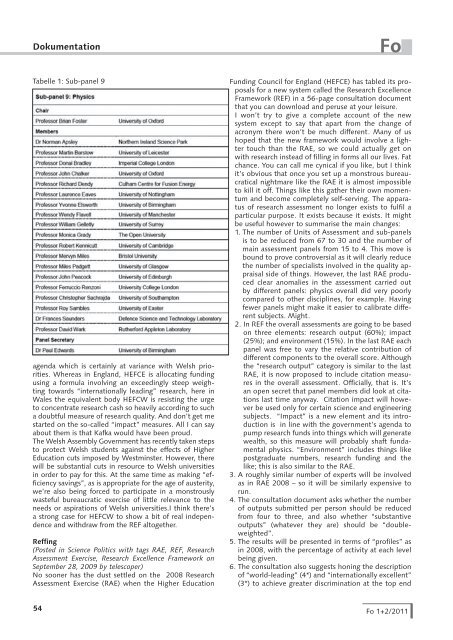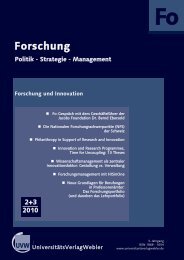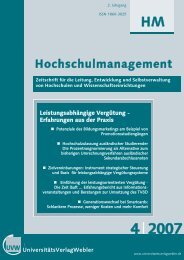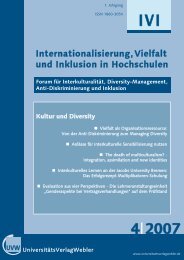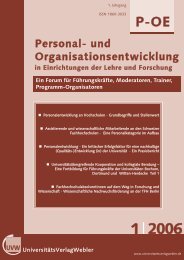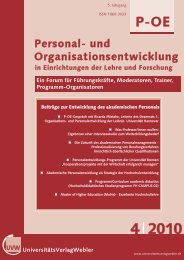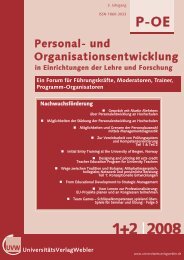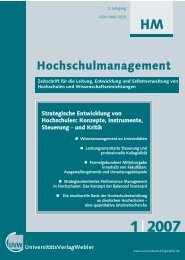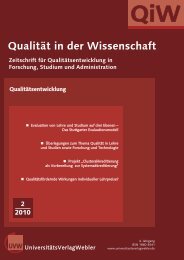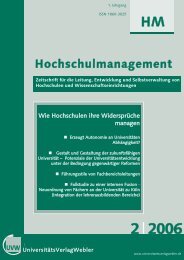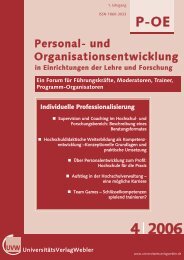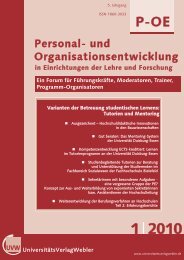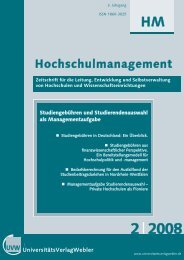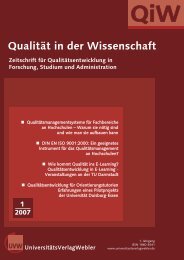Heft 1 + 2 / 2011 - UniversitätsVerlagWebler
Heft 1 + 2 / 2011 - UniversitätsVerlagWebler
Heft 1 + 2 / 2011 - UniversitätsVerlagWebler
Erfolgreiche ePaper selbst erstellen
Machen Sie aus Ihren PDF Publikationen ein blätterbares Flipbook mit unserer einzigartigen Google optimierten e-Paper Software.
Dokumentation<br />
Fo<br />
Tabelle 1: Sub-panel 9<br />
agenda which is certainly at variance with Welsh priorities.<br />
Whereas in England, HEFCE is allocating funding<br />
using a formula involving an exceedingly steep weighting<br />
towards “internationally leading” research, here in<br />
Wales the equivalent body HEFCW is resisting the urge<br />
to concentrate research cash so heavily according to such<br />
a doubtful measure of research quality. And don’t get me<br />
started on the so-called “impact” measures. All I can say<br />
about them is that Kafka would have been proud.<br />
The Welsh Assembly Government has recently taken steps<br />
to protect Welsh students against the effects of Higher<br />
Education cuts imposed by Westminster. However, there<br />
will be substantial cuts in resource to Welsh universities<br />
in order to pay for this. At the same time as making “efficiency<br />
savings”, as is appropriate for the age of austerity,<br />
we’re also being forced to participate in a monstrously<br />
wasteful bureaucratic exercise of little relevance to the<br />
needs or aspirations of Welsh universities.I think there’s<br />
a strong case for HEFCW to show a bit of real independence<br />
and withdraw from the REF altogether.<br />
Reffing<br />
(Posted in Science Politics with tags RAE, REF, Research<br />
Assessment Exercise, Research Excellence Framework on<br />
September 28, 2009 by telescoper)<br />
No sooner has the dust settled on the 2008 Research<br />
Assessment Exercise (RAE) when the Higher Education<br />
Funding Council for England (HEFCE) has tabled its proposals<br />
for a new system called the Research Excellence<br />
Framework (REF) in a 56-page consultation document<br />
that you can download and peruse at your leisure.<br />
I won’t try to give a complete account of the new<br />
system except to say that apart from the change of<br />
acronym there won’t be much different. Many of us<br />
hoped that the new framework would involve a lighter<br />
touch than the RAE, so we could actually get on<br />
with research instead of filling in forms all our lives. Fat<br />
chance. You can call me cynical if you like, but I think<br />
it’s obvious that once you set up a monstrous bureaucratical<br />
nightmare like the RAE it is almost impossible<br />
to kill it off. Things like this gather their own momentum<br />
and become completely self-serving. The apparatus<br />
of research assessment no longer exists to fulfil a<br />
particular purpose. It exists because it exists. It might<br />
be useful however to summarise the main changes:<br />
1. The number of Units of Assessment and sub-panels<br />
is to be reduced from 67 to 30 and the number of<br />
main assessment panels from 15 to 4. This move is<br />
bound to prove controversial as it will clearly reduce<br />
the number of specialists involved in the quality appraisal<br />
side of things. However, the last RAE produced<br />
clear anomalies in the assessment carried out<br />
by different panels: physics overall did very poorly<br />
compared to other disciplines, for example. Having<br />
fewer panels might make it easier to calibrate different<br />
subjects. Might.<br />
2. In REF the overall assessments are going to be based<br />
on three elements: research output (60%); impact<br />
(25%); and environment (15%). In the last RAE each<br />
panel was free to vary the relative contribution of<br />
different components to the overall score. Although<br />
the “research output” category is similar to the last<br />
RAE, it is now proposed to include citation measures<br />
in the overall assessment. Officially, that is. It’s<br />
an open secret that panel members did look at citations<br />
last time anyway. Citation impact will however<br />
be used only for certain science and engineering<br />
subjects. “Impact” is a new element and its introduction<br />
is in line with the government’s agenda to<br />
pump research funds into things which will generate<br />
wealth, so this measure will probably shaft fundamental<br />
physics. “Environment” includes things like<br />
postgraduate numbers, research funding and the<br />
like; this is also similar to the RAE.<br />
3. A roughly similar number of experts will be involved<br />
as in RAE 2008 – so it will be similarly expensive to<br />
run.<br />
4. The consultation document asks whether the number<br />
of outputs submitted per person should be reduced<br />
from four to three, and also whether “substantive<br />
outputs” (whatever they are) should be “doubleweighted”.<br />
5. The results will be presented in terms of “profiles” as<br />
in 2008, with the percentage of activity at each level<br />
being given.<br />
6. The consultation also suggests honing the description<br />
of “world-leading” (4*) and “internationally excellent”<br />
(3*) to achieve greater discrimination at the top end<br />
54 Fo 1+2/<strong>2011</strong>


